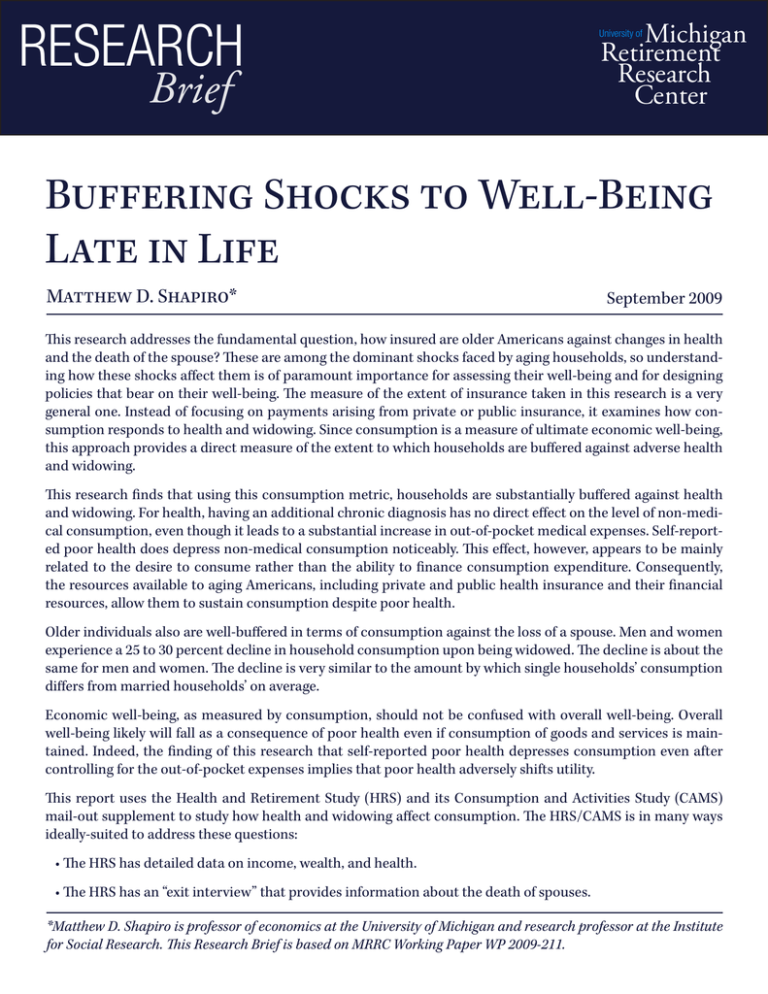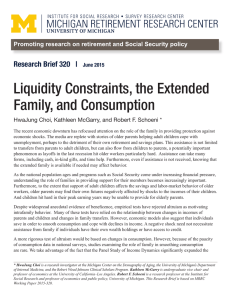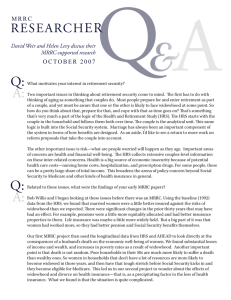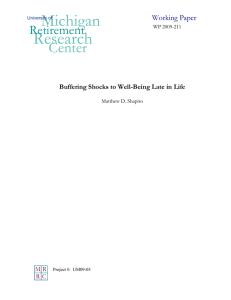ReseaRch Brief Buffering Shocks to Well-Being Late in Life
advertisement

ReseaRch Brief Michigan Retirement Research Center University of Buffering Shocks to Well-Being Late in Life Matthew D. Shapiro* September 2009 This research addresses the fundamental question, how insured are older Americans against changes in health and the death of the spouse? These are among the dominant shocks faced by aging households, so understanding how these shocks affect them is of paramount importance for assessing their well-being and for designing policies that bear on their well-being. The measure of the extent of insurance taken in this research is a very general one. Instead of focusing on payments arising from private or public insurance, it examines how consumption responds to health and widowing. Since consumption is a measure of ultimate economic well-being, this approach provides a direct measure of the extent to which households are buffered against adverse health and widowing. This research finds that using this consumption metric, households are substantially buffered against health and widowing. For health, having an additional chronic diagnosis has no direct effect on the level of non-medical consumption, even though it leads to a substantial increase in out-of-pocket medical expenses. Self-reported poor health does depress non-medical consumption noticeably. This effect, however, appears to be mainly related to the desire to consume rather than the ability to finance consumption expenditure. Consequently, the resources available to aging Americans, including private and public health insurance and their financial resources, allow them to sustain consumption despite poor health. Older individuals also are well-buffered in terms of consumption against the loss of a spouse. Men and women experience a 25 to 30 percent decline in household consumption upon being widowed. The decline is about the same for men and women. The decline is very similar to the amount by which single households’ consumption differs from married households’ on average. Economic well-being, as measured by consumption, should not be confused with overall well-being. Overall well-being likely will fall as a consequence of poor health even if consumption of goods and services is maintained. Indeed, the finding of this research that self-reported poor health depresses consumption even after controlling for the out-of-pocket expenses implies that poor health adversely shifts utility. This report uses the Health and Retirement Study (HRS) and its Consumption and Activities Study (CAMS) mail-out supplement to study how health and widowing affect consumption. The HRS/CAMS is in many ways ideally-suited to address these questions: • The HRS has detailed data on income, wealth, and health. • The HRS has an “exit interview” that provides information about the death of spouses. *Matthew D. Shapiro is professor of economics at the University of Michigan and research professor at the Institute for Social Research. This Research Brief is based on MRRC Working Paper WP 2009-211. • The CAMS survey that provides measurement of consumption for a sub-sample of HRS respondents. By combining HRS and CAMS data, the report can provide an estimate of how consumption responds to shocks and also provide evidence about what drives the response of consumption. Specifically, it will examine changes in income and wealth associated with widowing and what role these have in any changes in consumption. The HRS data allow for separate measurements of the effects of changes in Social Security income, private pensions, other income, and wealth. The following summarizes the main findings of this research: • There is remarkably little response of consumption to health status by HRS respondents. Health insurance is nearly universal and there is surprisingly little crowding out of non-health spending by non-insured, out-ofpocket expenses. This finding indicates that the constellation of social insurance, private insurance, and the use of assets substantially buffers older Americans against the adverse pecuniary effects of health shocks. Though there are certainly cases where health costs are a burden for seniors, on average they are well-insulated from these costs. • Consumption responds significantly to widowing. The consumption of households of surviving spouses falls by between 25 and 30 percent beyond the amount accounted for by change in number of individuals in the household. It recovers somewhat in later years, but after several years remains 15 to 20 percent lower. º The effect on consumption of losing a spouse is quite similar for men and women. º For both men and women, most of the drop in consumption cannot be attributed to changes in income and wealth associated with losing a spouse. For women, about one quarter in the drop in consumption can be traced to a drop in economic resources after the death of their husband. For men, even less of the drop in consumption can be traced to declines in income and wealth. In conclusion, using the consumption metric, older Americans appear to be well-buffered against poor health and loss of a spouse. This buffering is provided both by their private assets and insurance and by social insurance through the Social Security and Medicare programs. University of Michigan Retirement Research Center Institute for Social Research 426 Thompson Street Room 3026 Ann Arbor, MI 48104-2321 Phone: (734) 615-0422 Fax: (734) 615-2180 mrrc@isr.umich.edu www.mrrc.isr.umich.edu The research reported herein was performed pursuant to a grant from the U.S. Social Security administration (SSA) through the Michigan Retirement Research Center (MRRC). The findings and conclusions expressed are solely those of the author(s) and do not represent the views of SSA, any agency of the federal government, or the MRRC. Regents of the University of Michigan: Julia Donovan Darlow, Laurence B. Deitch, Denise Ilitch, Olivia P. Maynard, Andrea Fischer Newman, Andrew C. Richner, S. Martin Taylor, Katherine E. White, Mary Sue Coleman, Ex Officio


